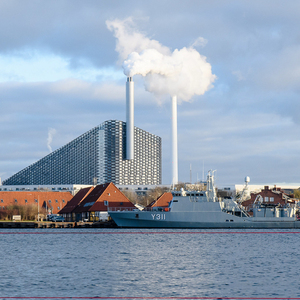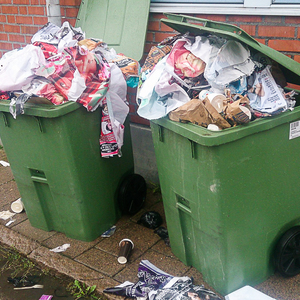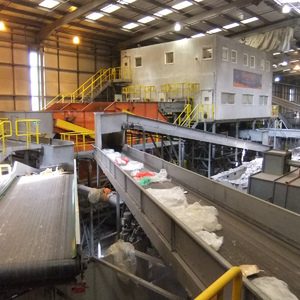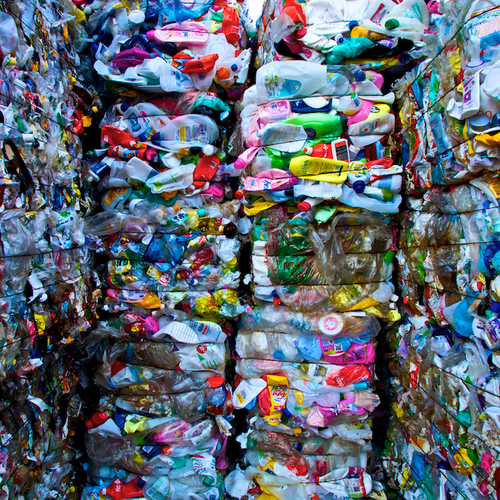
Many U.S. households continue to recycle cardboard, paper, and plastic, but a change in China’s import rules is sending more of this material to landfills and incinerators as recycling programs in many communities falter.
Once a major importer of U.S. recycled plastics and paper, China imposed strict new rules on what could be imported in early 2018. The decision effectively barred materials that were even slightly contaminated, upending recycling programs in many parts of the U.S.
China’s rules continue to tighten. The initial ban on two dozen varieties of waste was broadened at the end of last year to include scrap ships and auto parts, Reuters reports. Additional types of steel, copper, and aluminum will be banned this year.
The impact on many municipal recycling programs has been severe, The New York Times said. In Memphis, recycling bins can still be found at the airport, but everything that travelers put there goes to a landfill. In Deltona, Florida, The Times said, a curbside recycling program has suspended. The same story is being played out in hundreds of communities around the country.
Some private companies that collect recycled materials are upping rates because they no longer have ready markets. That has put municipal officials in the uncomfortable position of raising taxes to pay for the programs, or dropping recycling altogether.
For China, the new rules are intended to keep “foreign garbage” out of the country as it looks for ways to deal with its own huge stockpiles of recyclables. But choking off what had been a convenient outlet for paper and plastic waste in the West is causing increasing pain here. Fiona Ma, California’s state treasurer, described the situation as a “crisis moment in the recycling movement right now.”
Waste-to-energy plants take some of the excess
Burning waste at least generates some electricity, but waste-to-energy plants also raise concerns about increased levels of air pollution. For example, The Guardian reported that some 200 tons of recyclables from Philadelphia are now shuttled daily to an incinerator in neighboring Chester City, Pennsylvania.
There, a group called Chester Residents Concerned for Quality Living opposed to the incinerator worries that it will only make health problems in the city worse. Rates of ovarian and lung cancer are higher there than in the rest of the state, and nearly 40% of children in Chester City have asthma, The Guardian said.
In all, the enormous Covanta incinerator there burns about 3,510 tons of trash per day. The problem, says Claire Arkin of the Global Alliance for Incinerator Alternatives, is that many of the country’s incinerators are “on their last legs” and don’t have the latest pollution controls. “You may think burning plastic means ‘poof, it’s gone,’ ” she said, “but it puts some very nasty pollution into the air for communities that are already dealing with high rates of asthma and cancer.”
Some Chester residents won’t allow their children to play outside because of how bad the air smells and because of heavy truck traffic headed to the plant.
Covanta says that pollution controls keep airborne toxins below the limits set by state and federal law. The company’s chief sustainability officer, Paul Gilman, said that burning recyclables is better environmentally than sending them to a landfill because of the methane that landfills give off. But even Covanta is hoping that Philadelphia’s recycling program gets back on track because the incinerator wasn’t designed to burn recyclables.
Waste industry seeks changes in China policy
The National Waste and Recycling Association, a trade group representing recyclers and waste handlers, said it has sent a letter to President Donald Trump asking him to make China’s policy on recycled material part of ongoing trade talks.
China consumed more than 50% of the world’s recycled paper and plastic in 2016, the association said in fact sheet posted at its website. Since China’s new policies have taken effect, the prices paid for some recyclables have fallen sharply. Corrugated cardboard, for example, was worth $105 a ton in December 2017 but only $70 a ton a year later. Prices for mixed paper fell from $32 a ton to $4.69 a ton over the same period.
Chinese restrictions could eventually lead to the loss of tens of thousands of U.S. jobs and the closure of many recycling businesses, association President and CEO Darrell Smith said in a written statement.
The group has requested that China phase in its new requirements over a five-year period to give recyclers globally more time to adapt. At it is, the change in Chinese policy could have a “devastating effect on recycling that may set the industry back decades,” Smith.
“NWRA supports the efforts of the Chinese government to improve environmental protection and standards within its recycling infrastructure,” Smith’s letter said. “However, its decision to ban the importation of recyclable materials that do not meet its impractical standard will have a significant impact on the waste and recycling industry.”
The association has recommended a number of measures to its members: make sure recyclables are of high quality; focus on “core recyclables” to reduce contamination; and collaborate with state and city officials to solve what’s become a global problem.
If you’re interested in learning more about what not to toss in the recycling bin, this explainer from The Times might help.
Weekly Newsletter
Get building science and energy efficiency advice, plus special offers, in your inbox.















10 Comments
I've read that waste aluminium (can) is also accumulating and companies are having a hard time finding other sources for it other than more can. Apparently some industries (aircraft) will only accept parts made from "virgin" aluminium. Very strange.
Should we just stop recycling and dump the items in with the regular household trash?
Not a popular opinion, but often the best thing for the environment is to put something in a landfill and use the time and cost saved for other environmentally beneficial things.
I can think of lots of cases where I wouldn't want to use recycled materials that potentially contain an incredible variety of contaminates. Water bottles made from recycled pesticide containers?
I'm not anti-recycling - but it needs to make sense as compared to other things in our not-unlimited resource world.
Plastics are extremely difficult to recycle although I've read that there's experimentation going on to convert used plastics into motor oil/lubricants. It's much better than dumping in the ocean however there's a new type of plastic to worry about . Microplastics* are suspected as being just a bad for oceans as pieces which can been seen with the naked eye.
* I've joked over the years that many "greens" want to force everyone to live in the smallest space possible and wear biodegradable clothing. Well that time is getting closer. The WSJ reported on a study of environmental impact of micro-plastics. What are they? These are the plastics which naturally shed off synthetic fibers. A significant source is clothing which sheds this material every time it goes through the wash. The study allegedly even found micro-plastics in areas such as drinking(bottled?) water and beer. Go figure.
It would be interesting to see analysis of how all this will eventually play out. How much of this problem is a short term time dependent one where recycling infrastructure in the US or elsewhere will meet the demand vs. where the economics outside China will not be viable.
Ironic, on how it has come full circle. For years they kept driving home that we need to recycle and sure enough, almost all communities now have mandatory recycling. Fast forward to today. Now they say that the recyclables are being burned and thrown into the ocean, as there is no space or viable market for it.
Excuse my cynical side but we are truly doomed as a species. We either kill each other through wars or we end up pillaging our resources until we have nothing left. Welcome to the human condition. Thousands of years ago in the B.C. times, ancient writers of the Bible said that we as humans are doomed to destruction because of our nature. Fast forward to 2019 and it still stands true. 100's of millions of deaths by wars and the pillaging of planet earth causing the extinction or near extinction of species caused by humans. Rant off.
Now back to the scheduled programming :)
Millions of years ago microorganisms (only life around) almost caused planet wide extinction when they produced so much oxygen that it displaced enough methane to essentially cool the earth to the point where it was covered in ice. It took volcanic activity to thaw the planet.
There have been something like 5 mass extinctions on earth. There's no reason why there won't be another.
As for your ocean pollution comment. Ya, that's disappointing but we shouldn't be surprised when there is no such thing as private ownership of oceans. Tragedy of the commons.
Maybe the lack of markets for recycling will force us in to reducing and reusing.
Maybe the retail store where we acquire all this junk should also be responsible for dealing with the returned packaging. Who knows, we might go back to refilling standardized glass containers, and having deposits on these containers? That might also curtail the on line shopping juggernaut created in this decade.
It's frustrating to see the U.S. struggle with recycling while Chinese trade rules add to the problem. We need better solutions to reduce waste and promote sustainability.
It's no surprise that U.S. recycling efforts are facing challenges, especially with the impact of Chinese trade rules. It's disheartening to see our recycling systems stumble when they play such a crucial role in environmental sustainability. On a personal note, I recently started a recycling campaign in my neighborhood, and let me tell you, it's been quite a process. Finding affordable forklifts was one of the major hurdles I encountered, but I managed to overcome it by hiring one from https://anguslifttrucks.co.uk/forklift-hire-uk/. It's been a learning experience for sure!
Log in or create an account to post a comment.
Sign up Log in